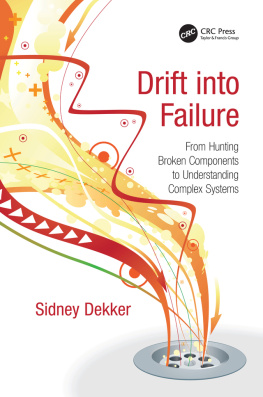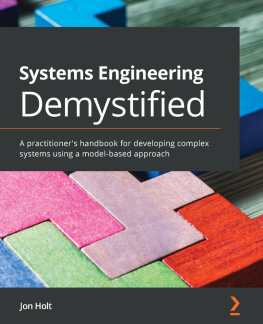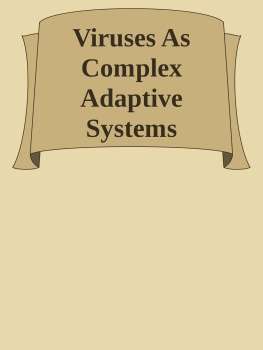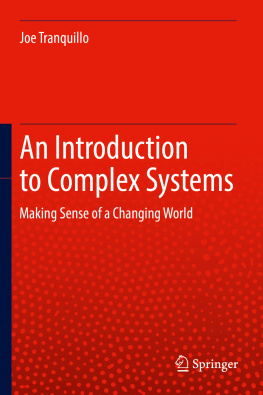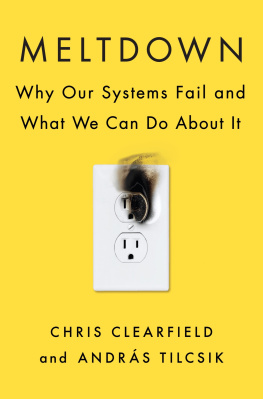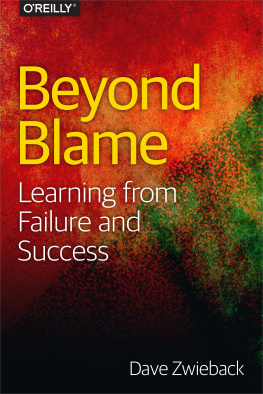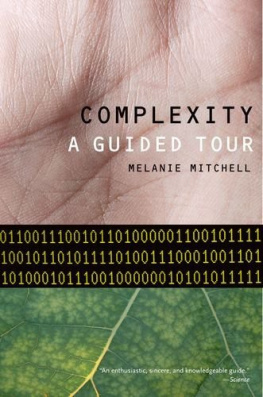DRIFT INTO FAILURE
Drift Into Failure
From Hunting Broken Components to Understanding Complex Systems
Sidney Dekker
CRC Press
Taylor & Francis Group
6000 Broken Sound Parkway NW, Suite 300
Boca Raton, FL 334872742
2011 by Sidney Dekker
CRC Press is an imprint of Taylor & Francis Group, an Informa business
No claim to original U.S. Government works
Printed on acid-free paper
Version Date: 20160226
International Standard Book Number-13:978-1-4094-2222-8 (Hardback) 978-1-4094-2221-1 (Paperback)
This book contains information obtained from authentic and highly regarded sources. Reasonable efforts have been made to publish reliable data and information, but the author and publisher cannot assume responsibility for the validity of all materials or the consequences of their use. The authors and publishers have attempted to trace the copyright holders of all material reproduced in this publication and apologize to copyright holders if permission to publish in this form has not been obtained. If any copyright material has not been acknowledged please write and let us know so we may rectify in any future reprint.
Except as permitted under U.S. Copyright Law, no part of this book may be reprinted, reproduced, transmitted, or utilized in any form by any electronic, mechanical, or other means, now known or hereafter invented, including photocopying, microfilming, and recording, or in any information storage or retrieval system, without written permission from the publishers.
For permission to photocopy or use material electronically from this work, please access www.copyright.com (http://www.copyright.com/) or contact the Copyright Clearance Center, Inc. (CCC), 222 Rosewood Drive, Danvers, MA 01923, 9787508400. CCC is a not-for-profit organization that provides licenses and registration for a variety of users. For organizations that have been granted a photocopy license by the CCC, a separate system of payment has been arranged.
Trademark Notice: Product or corporate names may be trademarks or registered trademarks, and are used only for identification and explanation without intent to infringe.
Visit the Taylor & Francis Web site at
http://www.taylorandfrancis.com
and the CRC Press Web site at
http://www.crcpress.com
Contents
I want to thank Paul Cilliers and Jannie Hofmeyr at the Centre for Studies in Complexity at the University of Stellenbosch, South Africa, for our fascinating discussions on complexity, ethics and system failure. I also want to thank Eric Wahren and Darrell Horn for their studious reading of earlier drafts and their helpful comments for improvement.
"'Accidents come from relationships, not broken parts." Sidney Dekker's meticulously researched and engagingly written Drift into Failure: From Hunting Broken Parts to Understanding Complex Systems explains complex system failures and offers practical recommendations for their investigation and prevention from the combined perspectives of unruly technology, complexity theory, and post-Newtonian analysis. A valuable source book for anyone responsible for, or interested in, Organizational safety.'
Steven P. Bezman, Aviation Safety Researcher
'Dekker's book challenges the current prevalent notions about accident causation and system safety. He argues that even now, what profess to be systemic approaches to explaining accidents are still caught within a limited framework of 'cause and effect' thinking, with its origins in the work of Descartes and Newton. Instead, Dekker draws his inspiration from the science of complexity and theorises how seemingly reasonable actions at a local lavel may promulgate and proliferate in unseen (and unknowable) ways until finally some apparent system "failure " occurs. The book is liberally illustrated with detailed ease studies to articulate these ideas. As with all Dekker's books, the text walks a fine line between making a persuasive argument and provoking an argument. Love it or hate it, you can't ignore it.'
Don Harris, HFI Solutions Ltd
'Dekker's book contributes to the growing debate around the nature of retrospective investigations of safety-critical situations in complex systems. Both provocative and insightful, the author shines a powerful light on the severe limits of traditional linear approaches. His call for a diversity of voices and narratives, to deepen our understanding of accidents, will be welcomed in healthcare. Dekker's proposal that we shift from going "down and in " to "up and out" suggests a paradigm shift in accident investigation.'
Rob Robson, Healthcare System Safety and Accountability, Canada
'Professor Dekker explodes the myth that complex economic, technological and environmental failures can be investigated by approaches fossilized in linear, Newtonian-Cartesian logic. Today nearly 7 billion people unconsciously reshape themselves, their organizations, and societies through the use of rapidly-evolving, proliferating and miniaturizing technologies powered by programs that supersede the intellectual grasp of their developers. Serious proponents of the next high reliability organizations would do well to absorb Drift into Failure.'
Jerry Poje, Founding Board Member of the U.S. Chemical Safety and Hazard Investigation Board
'Today, catastrophic accidents resulting from failure of simple components confound industry. In Drift into Failure, Dekker shows how reductionist analysis breaking the system down until we find the "broken part" does not explain why accidents in complex systems occur. Dekker introduces the systems approach. Reductionism delivers an inventory of broken parts; Dekker's book offers a genuine possibility of future prevention. The systems approach may allow us to Drift into Success.'
John O'Meara, HAZOZ
When I was in graduate school for my doctorate, we always talked about the systems we studied as complex and dynamic. Aviation, nuclear power, medicine, process control these were the industries that we were interested in, and that seemed to defy simple, linear modeling industries that demand of us, researchers, safety analysts, a commitment to penetrate the elaborate, intricate and live ways in which their work ebbs and flows, in which human expertise is applied, how organizational, economic and political forces suffuse and Constrain their functioning over time.
Back then, and during most of my work in the years since, I have not encountered many models that are complex or dynamic. Instead, they are mostly simple and static. Granted, models are models for a reason: they are abstractions, simplifications, or perhaps no more than hopes, projections. Were a perfect model possible, one that completely and accurately represented the dynamics and complexity of its object, then its very specificity would defeat the purpose of modeling.
So models always make sacrifices of some kind. The question, though, is whether our models sacrifice inconsequential aspects of the worlds we wish to understand and control, or vital aspects.
During my first quarter in graduate school I took five classes, thinking this would be no problem. Well, actually, I didn't really think about it much at all. What concerned me was that I wanted as much value for money as I could get. I paid for my first quarter in grad school myself, which, for an international student, was a significant outlay (from there on I became a Graduate Research Assistant and the tuition was waived, otherwise I would not be writing this or much of anything else). For that first quarter, the earnings from a summer consulting job were burnt in one invoice. Then something interesting happened. Somehow I found out that with the four classes I had to take, I had reached a kind of maximum level beyond which apparently not even Ohio State could morally muster to extort more money from its international students. I could, in other words, throw in a class for the fun of it.

